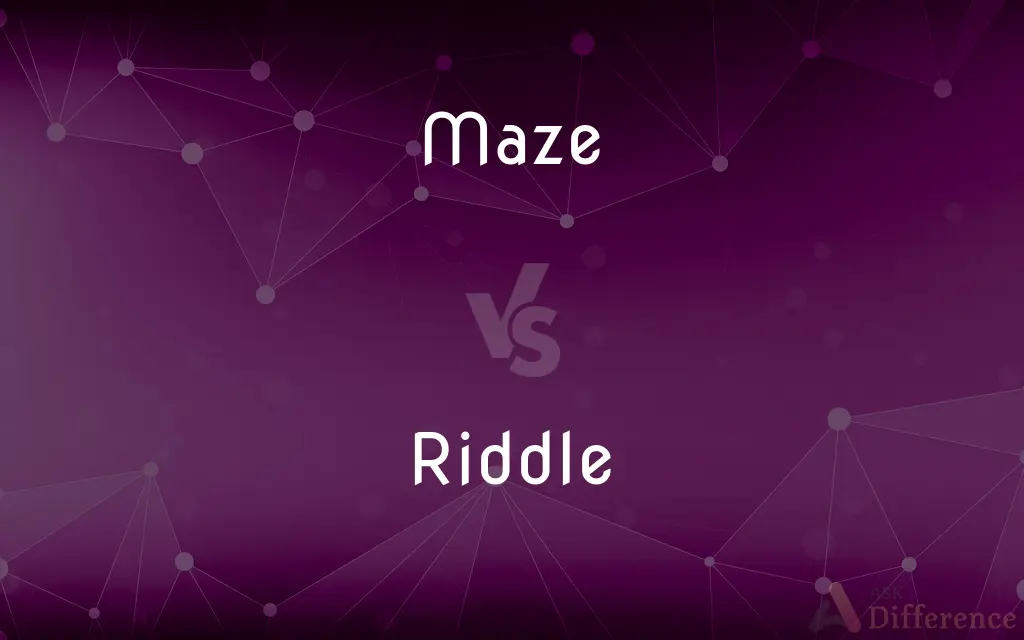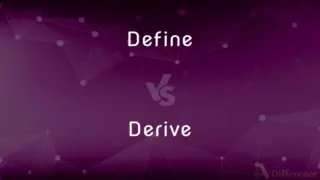Maze vs. Riddle — What's the Difference?
By Urooj Arif & Maham Liaqat — Updated on April 1, 2024
A maze is a complex, branching puzzle with paths, while a riddle is a question or statement requiring thought to answer or interpret.

Difference Between Maze and Riddle
Table of Contents
ADVERTISEMENT
Key Differences
Mazes are physical or virtual puzzles that require navigation through a complex network to reach a goal, often emphasizing spatial awareness and problem-solving skills. They can be found in various forms, from garden labyrinths to video game levels, and are designed to challenge the participant's ability to plan and execute a path through a complex network. Riddles, on the other hand, are a form of word puzzle that poses a question or statement that requires creative thinking for its solution. They have been a part of human culture for centuries, serving as a tool for entertainment, education, and sometimes as a test of wisdom.
Mazes can be either "unicursal", with a single path to the end, or "multicursal", offering many choices, dead ends, and loops, thereby increasing the difficulty of finding the correct path. Riddles can range from simple and straightforward to complex and abstract, often involving plays on words, and they require linguistic and sometimes cultural knowledge to solve.
Both mazes and riddles engage the mind, but they do so in different ways. Mazes test spatial navigation and decision-making under uncertainty, pushing the solver to recognize patterns and remember paths. Riddles challenge the solver's linguistic abilities and capacity for lateral thinking, requiring the unraveling of clues hidden within language.
Mazes, with their spatial and navigational challenges, offer a tangible sense of exploration and discovery. Solvers physically or virtually move through space, making choices at intersections, and experiencing the consequences of those choices immediately. This can lead to a satisfying sense of progression as the solution is gradually revealed through exploration and trial and error. Riddles, by contrast, engage the solver in a mental journey, where the answer is reached not by moving through space but by shifting perspectives and understanding the often hidden meanings of words. The satisfaction in solving a riddle comes from the "aha" moment when the solution clicks, often after considering and discarding several possible interpretations.
Comparison Chart
Nature
Physical or virtual puzzle with paths
Question or statement requiring interpretation
ADVERTISEMENT
Challenge
Spatial navigation and problem-solving
Linguistic and lateral thinking
Form
Can be unicursal or multicursal
Often involves plays on words
Purpose
To reach a goal through complex paths
To find an answer through creative thinking
Experience
Sense of exploration and discovery
Mental journey and "aha" moment
Compare with Definitions
Maze
Can be designed as either unicursal (with a single path) or multicursal (with multiple paths and dead ends).
The multicursal maze offered many false paths, making it more challenging.
Riddle
A question or statement intentionally phrased to require ingenuity in ascertaining its answer.
The riddle What has keys but can't open locks? puzzled her for hours.
Maze
Used metaphorically to describe complex situations.
Navigating the legal system felt like wandering through a maze.
Riddle
Serves as a mental exercise to test one's wit and creativity.
Solving riddles is a great way to exercise your brain.
Maze
A complex network of paths or passages.
The garden maze was so intricate that visitors often used maps to navigate it.
Riddle
Can be simple for children or complex for adults, showcasing the versatility of the form.
Riddles vary in complexity, catering to a wide range of ages and intellectual abilities.
Maze
A puzzle challenging one's ability to find a path from entrance to exit.
Children love the challenge of solving mazes in their activity books.
Riddle
Often used as a form of wordplay involving double meanings or clever use of language.
Riddles often rely on homophones to mislead the solver.
Maze
A tool for studying spatial navigation and memory in both humans and animals.
Scientists use mazes to understand how rats learn and remember paths.
Riddle
Used historically as tests of wisdom or gatekeeping challenges in myths and folklore.
Heroes in stories often had to solve a riddle to gain entry to a guarded place.
Maze
A maze is a path or collection of paths, typically from an entrance to a goal. The word is used to refer both to branching tour puzzles through which the solver must find a route, and to simpler non-branching ("unicursal") patterns that lead unambiguously through a convoluted layout to a goal.
Riddle
A riddle is a statement, question or phrase having a double or veiled meaning, put forth as a puzzle to be solved. Riddles are of two types: enigmas, which are problems generally expressed in metaphorical or allegorical language that require ingenuity and careful thinking for their solution, and conundra, which are questions relying for their effects on punning in either the question or the answer.
Maze
An intricate, usually confusing network of interconnecting pathways, as in a garden; a labyrinth.
Riddle
To pierce with numerous holes; perforate
Riddle a target with bullets.
Maze
A physical situation in which it is easy to get lost
A maze of bureaucratic divisions.
Riddle
To spread throughout
"Election campaigns have always been riddled with demagogy and worse" (New Republic).
Maze
A graphic puzzle, the solution of which is an uninterrupted path through an intricate pattern of line segments from a starting point to a goal.
Riddle
To put (gravel, for example) through a coarse sieve.
Maze
Something made up of many confused or conflicting elements; a tangle
A maze of government regulations.
Riddle
To solve or explain.
Maze
To bewilder or astonish.
Riddle
To propound or solve riddles.
Maze
To stupefy; daze.
Riddle
To speak in riddles.
Maze
A labyrinth; a puzzle consisting of a complicated network of paths or passages, the aim of which is to find one's way through.
Riddle
A coarse sieve, as for gravel.
Maze
Something made up of many confused or conflicting elements; a tangle.
Riddle
A question or statement requiring thought to answer or understand; a conundrum.
Maze
(archaic) Confusion of thought; state of bewilderment.
Riddle
One that is perplexing; an enigma.
Maze
To amaze, astonish, bewilder.
Riddle
A verbal puzzle, mystery, or other problem of an intellectual nature.
Here's a riddle: It's black, and white, and red all over. What is it?
Maze
To daze or stupefy.
Riddle
An ancient verbal, poetic, or literary form, in which, rather than a rhyme scheme, there are parallel opposing expressions with a hidden meaning.
Maze
A wild fancy; a confused notion.
Riddle
A sieve with coarse meshes, usually of wire, for separating coarser materials from finer, as chaff from grain, cinders from ashes, or gravel from sand.
Maze
Confusion of thought; perplexity; uncertainty; state of bewilderment.
Riddle
A board with a row of pins, set zigzag, between which wire is drawn to straighten it.
Maze
A confusing and baffling network, as of paths or passages; an intricacy; a labyrinth.
Or down the tempting maze of Shawford brook.
The ways of Heaven are dark and intricate,Puzzled with mazes, and perplexed with error.
Riddle
(obsolete) A curtain; bedcurtain.
Maze
A complex and confusing system or set of rules that causes bwilderment; as, a maze of environemntal regulations.
Riddle
(religious) One of the pair of curtains enclosing an altar on the north and south.
Maze
To perplex greatly; to bewilder; to astonish and confuse; to amaze.
Riddle
To speak ambiguously or enigmatically.
Maze
To be bewildered.
Riddle
(transitive) To solve, answer, or explicate a riddle or question.
Riddle me this.
Maze
Complex system of paths or tunnels in which it is easy to get lost
Riddle
To put something through a riddle or sieve; to sieve; to sift.
You have to riddle the gravel before you lay it on the road.
Maze
Something jumbled or confused;
A tangle of government regulations
Riddle
To fill or spread throughout; to pervade.
Your argument is riddled with errors.
Riddle
To plait.
Riddle
A sieve with coarse meshes, usually of wire, for separating coarser materials from finer, as chaff from grain, cinders from ashes, or gravel from sand.
Riddle
A board having a row of pins, set zigzag, between which wire is drawn to straighten it.
Riddle
Something proposed to be solved by guessing or conjecture; a puzzling question; an ambiguous proposition; an enigma; hence, anything ambiguous or puzzling.
To wring from me, and tell to them, my secret,That solved the riddle which I had proposed.
'T was a strange riddle of a lady.
Riddle
To separate, as grain from the chaff, with a riddle; to pass through a riddle; as, riddle wheat; to riddle coal or gravel.
Riddle
To perforate so as to make like a riddle; to make many holes in; as, a house riddled with shot.
Riddle
To explain; to solve; to unriddle.
Riddle me this, and guess him if you can.
Riddle
To speak ambiguously or enigmatically.
Riddle
A difficult problem
Riddle
A coarse sieve (as for gravel)
Riddle
Pierce many times;
The bullets riddled his body
Riddle
Set a difficult problem or riddle;
Riddle me a riddle
Riddle
Separate with a riddle, as grain from chaff
Riddle
Speak in riddles
Riddle
Explain a riddle
Common Curiosities
Can a maze be considered a form of riddle?
While both are puzzles, a maze is a spatial challenge, whereas a riddle is linguistic; they engage different types of problem-solving skills.
What is the main purpose of a maze?
To challenge spatial navigation skills by finding a path through a complex network.
How do riddles engage the mind?
By requiring creative and lateral thinking to interpret and solve word puzzles.
Why do children enjoy solving mazes?
They offer a sense of adventure and achievement in finding the solution.
What role do riddles play in education?
They encourage critical thinking and comprehension skills.
What makes a good riddle?
Clever use of language, ambiguity, and requiring insightful thinking for the solution.
Can a riddle be a part of a maze?
Yes, riddles can be incorporated into mazes as part of the challenges.
Are all mazes designed to be difficult?
Not all; difficulty varies from simple paths (unicursal) to complex labyrinths with dead ends (multicursal).
Can solving riddles improve your brain function?
Yes, by enhancing creative thinking and problem-solving skills.
How are mazes used in research?
To study spatial memory and navigation in humans and animals.
What’s the difference between a labyrinth and a maze?
A labyrinth has a single, non-branching path to the center, while a maze offers choices and dead ends.
Are there digital forms of mazes and riddles?
Yes, both can be found in digital formats, such as in video games and apps.
How old is the practice of creating mazes and riddles?
Both date back to ancient times, serving as entertainment and tests of wit.
Do mazes have to be physical?
No, they can also be virtual, such as those found in video games.
Is there a cultural significance to mazes or riddles?
Yes, both have been used in various cultures for religious, ceremonial, or educational purposes.
Share Your Discovery

Previous Comparison
Define vs. Derive
Next Comparison
Pome vs. DrupeAuthor Spotlight
Written by
Urooj ArifUrooj is a skilled content writer at Ask Difference, known for her exceptional ability to simplify complex topics into engaging and informative content. With a passion for research and a flair for clear, concise writing, she consistently delivers articles that resonate with our diverse audience.
Co-written by
Maham Liaqat














































